formerly eScholarship Editions


|
|
|
|
Your request for similar items found 20 book(s). | Modify Search | Displaying 1 - 20 of 20 book(s) | |
| 1. | 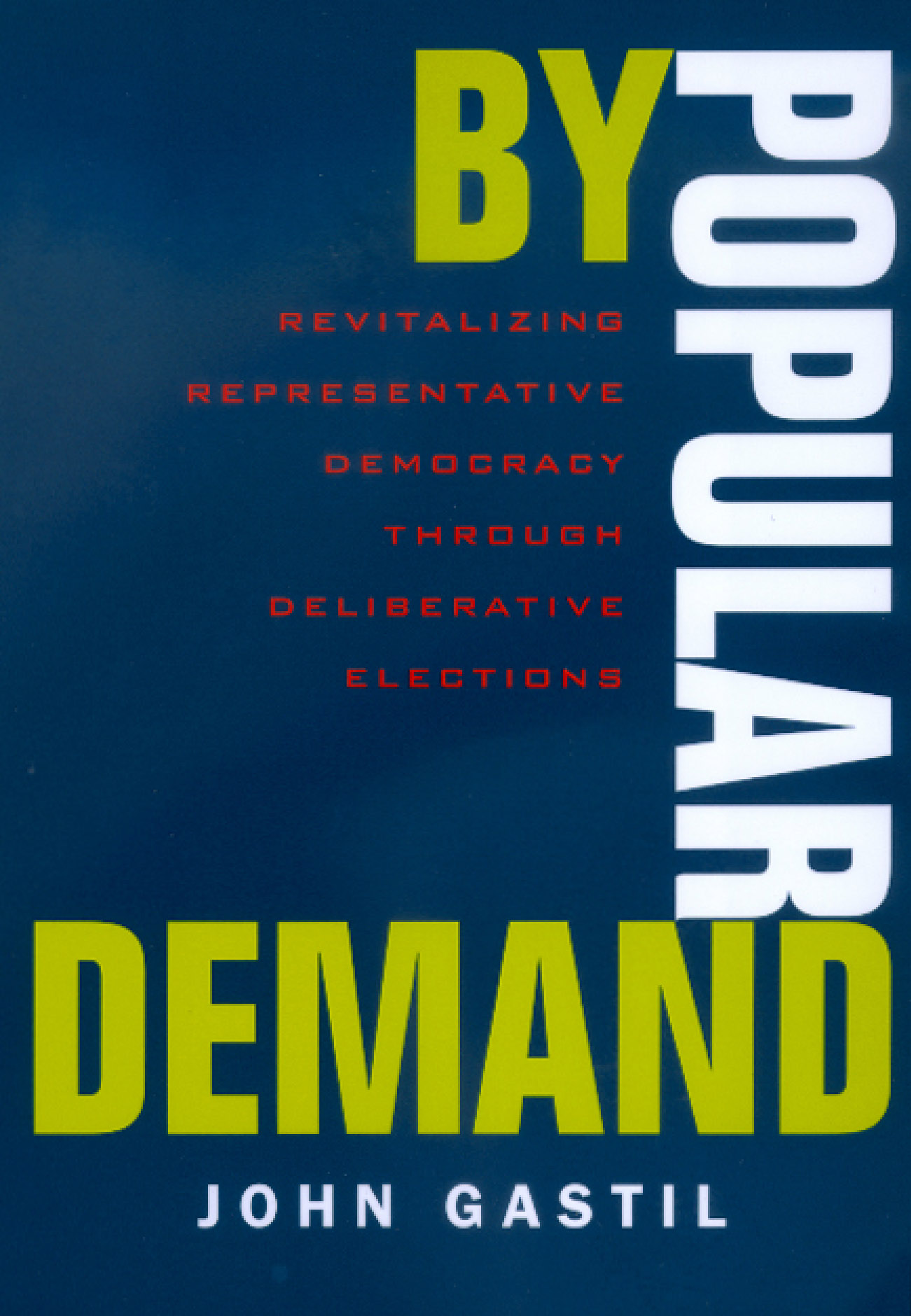 | Title: By popular demand: revitalizing representative democracy through deliberative elections Author: Gastil, John Published: University of California Press, 2000 Subjects: Politics Publisher's Description: John Gastil challenges conventional assumptions about public opinion, elections, and political expression in this persuasive treatise on how to revitalize the system of representative democracy in the United States. Gastil argues that American citizens have difficulty developing clear policy interests, seldom reject unrepresentative public officials, and lack a strong public voice. Our growing awareness of a flawed electoral system is causing increased public cynicism and apathy. The most popular reforms, however, will neither restore public trust nor improve representation. Term limits and campaign finance reforms will increase turnover, but they provide no mechanism for improved deliberation and accountability. Building on the success of citizen juries and deliberative polling, Gastil proposes improving our current process by convening randomly selected panels of citizens to deliberate for several days on ballot measures and candidates. Voters would learn about the judgments of these citizen panels through voting guides and possibly information printed on official ballots. The result would be a more representative gov-ernment and a less cynical public. America has a long history of experimentation with electoral systems, and the proposals in By Popular Demand merit serious consideration and debate. [brief] Similar Items |
| 2. | 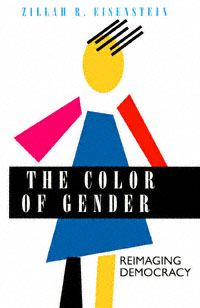 | Title: The color of gender: reimaging democracy Author: Eisenstein, Zillah R Published: University of California Press, 1994 Subjects: Gender Studies | European Literature | Literary Theory and Criticism | Women's Studies Publisher's Description: In this provocative volume, Zillah Eisenstein uncovers the hidden sexual and racial politics of the past decade. Beginning where she left off in her award-winning book The Female Body and the Law , Eisenstein takes the reader on a feminist-inspired road trip, traveling from the thicket of recent abortion decisions to the revolutions of 1989 to the murky chambers of the Anita Hill/Clarence Thomas hearings. Along the way, she enunciates a wholly original conception of individual privacy and sexual rights.Eisenstein brings a range of topics to her discussion: the L.A. riots, crack babies, Murphy Brown, political correctness, the 1992 presidential election, the Gulf War. She seeks to redirect our thinking about democracy away from universal conceptions that mask racial and gender oppression to the specific realities of women and people of color. A respect for multiple differences - as represented in the needs of women of color and their bodies - is, she says, essential to inclusive universal rights. Reproductive freedoms and sexual equality, not abstract notions of civil liberties, provide the wellsprings of a meaningful democratic life. Using this perspective to evaluate the Eastern European revolutions of 1989, Eisenstein finds that the separation between their ideals and the reality of the market system illustrates the failings of democratic theory, especially for women.Eisenstein's controversial arguments will provoke a rethinking of what race and gender mean today. [brief] Similar Items |
| 3. | 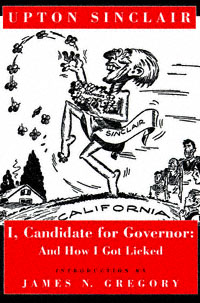 | Title: I, candidate for governor: and how I got licked Author: Sinclair, Upton 1878-1968 Published: University of California Press, 1994 Subjects: History | Politics | California and the West | United States History | Californian and Western History | Autobiography | American Studies Publisher's Description: Here, reprinted for the first time since its original publication, is muckraking journalist Upton Sinclair's lively, caustic account of the 1934 election campaign that turned California upside down and almost won him the governor's mansion.Using his "End Poverty in California" movement (more commonly called EPIC) as a springboard, Sinclair ran for governor as a Democrat, equipped with a bold plan to end the Depression in California by taking over idle land and factories and turning them into cooperative ventures for the unemployed. To his surprise, thousands rallied to the idea, converting what he had assumed would be another of his utopian schemes into a mass political movement of extraordinary dimensions. With a loosely knit organization of hundreds of local EPIC clubs, Sinclair overwhelmed the moderate Democratic opposition to capture the primary election. When it came to the general election, however, his opposition employed highly effective campaign tactics: overwhelming media hostility, vicious red-baiting and voter intimidation, high-priced dirty tricks. The result was a resounding defeat in November. I, Candidate tells the story of Sinclair's campaign while also capturing the turbulent political mood of the 1930s. Employing his trademark muckraking style, Sinclair exposes the conspiracies of power that ensured big-money control over the media and other powerful institutions. [brief] Similar Items |
| 4. | 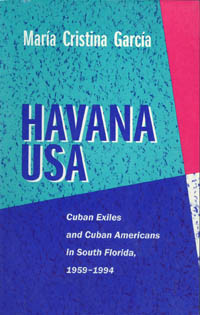 | Title: Havana USA: Cuban exiles and Cuban Americans in South Florida, 1959-1994 Author: García, Maria Cristina 1960- Published: University of California Press, 1996 Subjects: History | United States History | Latin American History | Ethnic Studies | Latino Studies Publisher's Description: In the years since Fidel Castro came to power, the migration of close to one million Cubans to the United States continues to remain one of the most fascinating, unusual, and controversial movements in American history. María Cristina García - a Cuban refugee raised in Miami - has experienced firsthand many of the developments she describes, and has written the most comprehensive and revealing account of the postrevolutionary Cuban migration to date. García deftly navigates the dichotomies and similarities between cultures and among generations. Her exploration of the complicated realm of Cuban American identity sets a new standard in social and cultural history. [brief] Similar Items |
| 5. | 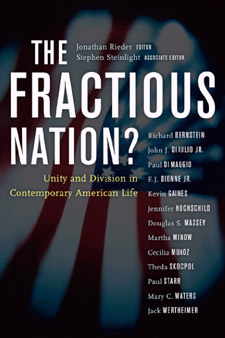 | Title: The fractious nation?: unity and division in contemporary American life Author: Rieder, Jonathan Published: University of California Press, 2003 Subjects: American Studies | Anthropology | Ethnic Studies | Politics | Religion | Sociology | Immigration Publisher's Description: What are we to make of the speed with which the new climate of national solidarity emerged after September 11? Does it not look strange against a backdrop of the much-touted divisiveness of American life? In truth, The Fractious Nation? makes clear, the contrast of the time of divisiveness before and the time of unity that followed is much too stark, indeed. Less than a year before two planes slammed into the World Trade Center, the 2000 presidential election produced not just the starkly blue and red electoral map but also the two tribal Americas those totemic colors emblazoned. And from the cultural wars to immigration restriction, from the Christian right to political correctness, recent decades have witnessed much hand-wringing on the left and the right about the fragmentation of American life. The Fractious Nation? enlists the critical intelligence of fourteen distinguished contributors who illuminate the schisms in American life and the often volatile debates they have inspired in the realms of culture, ethnic and racial pluralism, and political life. The collective wisdom of The Fractious Nation? suggests a counterview to all the overheated rhetoric. The authors warn against fixating on flamboyant incidents of racial conflict when black-and-white values overlap considerably. On a range of cultural issues, the gap between our citizens has closed as well. And even as the rivalry between liberalism and conservatism transmutes into new forms, the political center remains vital and democratic. We are tied together not just by shared values but by institutions - the Constitution, the culture of consumption, the etiquette of ethnic respect. In private life and public affairs, our nation has expanded the meaning of democratic citizenship. Still, there's no room for self-congratulations here. Tendencies toward preoccupation with private life encourage indifference to the suffering of the less privileged. This is also one of the main failings of the narrative of fragmentation: In its focus on matters of shared values, it too distracts from issues of poverty and inequality that also fragment the human spirit. [brief] Similar Items |
| 6. | 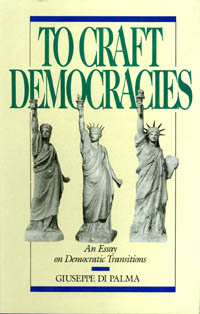 | Title: To craft democracies: an essay on democratic transitions Author: Di Palma, Giuseppe Published: University of California Press, 1990 Subjects: Politics | Russian and Eastern European Studies | History Publisher's Description: Is democracy a hot-house plant? Is it difficult to transplant it into new soil? The fall of so many dictatorships in the last few years - first in Southern Europe, then in Latin America, now in Eastern Europe - opens new, more optimistic perspectives on democratic development. The crises of dictatorships and the search for a new political order offer fertile ground for an examination of how best to effect democratic transitions.By focusing on the objective conditions that make democracy probable, sociological and historical theories of democracy often lose sight of what is possible. Here Giuseppe Di Palma instead explores those conciliatory political undertakings that political actors on all sides now engage in to make the improbable possible. His emphasis is on political crafting: in regard to constitutional choices, to alliances and convergences between contestants, to trade-offs, to the pacing of the transitions. Di Palma also examines the reasons - stalemate, the high cost of repression, a loss of goals, international constraints and inducements - that may motivate incumbents and nondemocratic political actors to accept democracy, even in those cases, as in Central America and Eastern Europe, where acceptance would seem least likely.An original and imaginative work that, in the light of recent transitions, challenges our assumptions about fledgling democracies and breaks new theoretical ground, To Craft Democracies will appeal to anyone interested in the way we forge our political communities today. [brief] Similar Items |
| 7. | 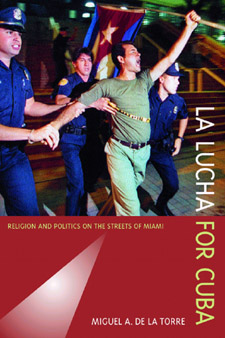 | Title: La lucha for Cuba: religion and politics on the streets of Miami Author: De La Torre, Miguel A Published: University of California Press, 2003 Subjects: Religion | Latino Studies | Politics | Christianity Publisher's Description: For many in Miami's Cuban exile community, hating Fidel Castro is as natural as loving one's children. This hatred, Miguel De La Torre suggests, has in fact taken on religious significance. In La Lucha for Cuba, De La Torre shows how Exilic Cubans, a once marginalized group, have risen to power and privilege - distinguishing themselves from other Hispanic communities in the United States - and how religion has figured in their ascension. Through the lens of religion and culture, his work also unmasks and explores intra-Hispanic structures of oppression operating among Cubans in Miami. Miami Cubans use a religious expression, la lucha, or "the struggle," to justify the power and privilege they have achieved. Within the context of la lucha, De La Torre explores the religious dichotomy created between the "children of light" (Exilic Cubans) and the "children of darkness" (Resident Cubans). Examining the recent saga of the Elián González custody battle, he shows how the cultural construction of la lucha has become a distinctly Miami-style spirituality that makes el exilio (exile) the basis for religious reflection, understanding, and practice - and that conflates political mobilization with spiritual meaning in an ongoing confrontation with evil. [brief] Similar Items |
| 8. | 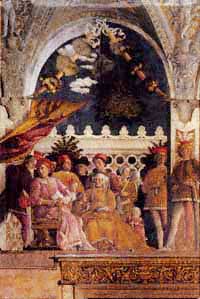 | Title: Knights at court: courtliness, chivalry, & courtesy from Ottonian Germany to the Italian Renaissance Author: Scaglione, Aldo D Published: University of California Press, 1992 Subjects: Literature | European Literature | Medieval Studies | Renaissance Literature Publisher's Description: Knights at Court is a grand tour and survey of manners, manhood, and court life in the Middle Ages, like no other in print. Composed on an epic canvas, this authoritative work traces the development of court culture and its various manifestations from the latter years of the Holy Roman Empire (ca. A.D. 1000) to the Italian Renaissance of the fifteenth and sixteenth centuries.Leading medievalist and Renaissance scholar Aldo Scaglione offers a sweeping sociological view of three geographic areas that reveals a surprising continuity of courtly forms and motifs: German romances; the lyrical and narrative literature of northern and southern France; Italy's chivalric poetry. Scaglione discusses a broad number of texts, from early Norman and Flemish baronial chronicles to the romances of Chrétien de Troyes, the troubadours and Minnesingers. He delves into the Niebelungenlied, Dante, Petrarch, Boccaccio, and an array of treatises on conduct down to Castiglione and his successors.All these works and Scaglione's superior scholarship attest to the enduring power over minds and hearts of a mentality that issued from a small minority of people - the courtiers and knights - in central positions of leadership and power. Knights at Court is for all scholars and students interested in "the civilizing process." [brief] Similar Items |
| 9. | 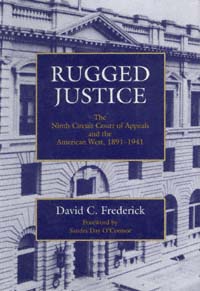 | Title: Rugged justice: the Ninth Circuit Court of Appeals and the American West, 1891-1941 Author: Frederick, David C Published: University of California Press, 1994 Subjects: History | History | United States History | Californian and Western History | California and the West | Law Publisher's Description: Few chapters in American judicial history have enjoyed as colorful a past as has the U.S. Court of Appeals for the Ninth Circuit. Created in 1891, its jurisdiction now encompasses California, Oregon, Nevada, Washington, Idaho, Montana, Arizona, Hawaii, and Alaska. David Frederick has mined archival sources, including court records and legal papers throughout the West and in Washington, D.C., to document the Ninth Circuit's first fifty years. His findings are much more than a record of the court, however, for they also provide a unique social and cultural history of the West.During these years, the court heard key cases involving railroads, the Alaska gold rush, Chinese immigration, organized labor, and use of natural resources. Many of the decisions from this period foreshadowed issues that are with us today. Frederick also documents the court's part in Western development and in issues relating to World War I, Prohibition, New Deal legislation, and the evolving role of federal judges.Frederick portrays the West's most important judicial institution with clarity and intelligence, reminding us that the evolution of the Ninth Circuit both reflected and affected the dramatic changes occurring in the West during the court's early years. This is a book that will appeal not only to lawyers, but to historians, sociologists, and general readers as well. [brief] Similar Items |
| 10. | 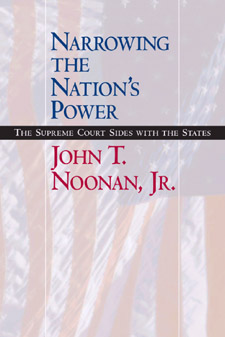 | Title: Narrowing the nation's power: the Supreme Court sides with the states Author: Noonan, John Thomas 1926- Published: University of California Press, 2002 Subjects: Law | American Studies | Political Theory Publisher's Description: Narrowing the Nation's Power is the tale of how a cohesive majority of the Supreme Court has, in the last six years, cut back the power of Congress and enhanced the autonomy of the fifty states. The immunity from suit of the sovereign, Blackstone taught, is necessary to preserve the people's idea that the sovereign is "a superior being." Promoting the common law doctrine of sovereign immunity to constitutional status, the current Supreme Court has used it to shield the states from damages for age discrimination, disability discrimination, and the violation of patents, trademarks, copyrights, and fair labor standards. Not just the states themselves, but every state-sponsored entity--a state insurance scheme, a state university's research lab, the Idaho Potato Commission - has been insulated from paying damages in tort or contract. Sovereign immunity, as Noonan puts it, has metastasized. "It only hurts when you think about it," Noonan's Yalewoman remarks. Crippled by the states' immunity, Congress has been further brought to heel by the Supreme Court's recent invention of two rules. The first rule: Congress must establish a documentary record that a national evil exists before Congress can legislate to protect life, liberty, or property under the Fourteenth Amendment. The second rule: The response of Congress to the evil must then be both "congruent" and "proportionate." The Supreme Court determines whether these standards are met, thereby making itself the master monitor of national legislation. Even legislation under the Commerce Clause has been found wanting, illustrated here by the story of Christy Brzonkala's attempt to redress multiple rapes at a state university by invoking the Violence Against Women Act. The nation's power has been remarkably narrowed. Noonan is a passionate believer in the place of persons in the law. Rules, he claims, are a necessary framework, but they must not obscure law's task of giving justice to persons. His critique of Supreme Court doctrine is driven by this conviction. [brief] Similar Items |
| 11. | 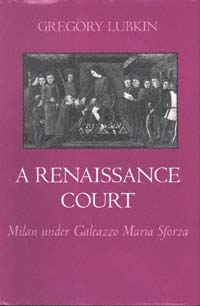 | Title: A Renaissance court: Milan under Galeazzo Maria Sforza Author: Lubkin, Gregory Published: University of California Press, 1994 Subjects: History | Renaissance History Publisher's Description: Ambitious, extravagant, progressive, and sexually notorious, Galeazzo Maria Sforza inherited the ducal throne of Milan in 1466, at the age of twenty-two. Although his reign ended tragically only ten years later, the young prince's court was a dynamic community where arts, policy making, and the panoply of state were integrated with the rhythms and preoccupations of daily life. Gregory Lubkin explores this vital but overlooked center of power, allowing the members of the Milanese court to speak for themselves and showing how dramatically Milan and its ruler exemplified the political, cultural, religious, and economic aspirations of Renaissance Italy. [brief] Similar Items |
| 12. | 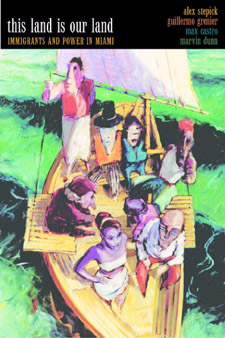 | Title: This land is our land: immigrants and power in Miami Author: Stepick, Alex Published: University of California Press, 2003 Subjects: American Studies | Anthropology | Ethnic Studies | Politics | Sociology | Urban Studies | Immigration Publisher's Description: For those opposed to immigration, Miami is a nightmare. Miami is the de facto capital of Latin America; it is a city where immigrants dominate, Spanish is ubiquitous, and Denny's is an ethnic restaurant. Are Miami's immigrants representative of a trend that is undermining American culture and identity? Drawing from in-depth fieldwork in the city and looking closely at recent events such as the Elián González case, This Land Is Our Land examines interactions between immigrants and established Americans in Miami to address fundamental questions of American identity and multiculturalism. Rather than focusing on questions of assimilation, as many other studies have, this book concentrates on interethnic relations to provide an entirely new perspective on the changes wrought by immigration in the United States. A balanced analysis of Miami's evolution over the last forty years, This Land Is Our Land is also a powerful demonstration that immigration in America is not simply an "us versus them" phenomenon. [brief] Similar Items |
| 13. | 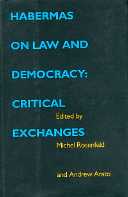 | Title: Habermas on law and democracy: critical exchanges Author: Rosenfeld, Michel 1948- Published: University of California Press, 1998 Subjects: Philosophy | Law | Politics Publisher's Description: In the first essay, Habermas himself succinctly presents the centerpiece of his theory: his proceduralist paradigm of law. The following essays comprise elaborations, criticisms, and further explorations by others of the most salient issues addressed in his theory. The distinguished group of contributors - internationally prominent scholars in the fields of law, philosophy, and social theory - includes many who have been closely identified with Habermas as well as some of his best-known critics. The final essay is a thorough and lengthy reply by Habermas, which not only engages the most important arguments raised in the preceding essays but also further elaborates and refines some of his own key contributions in Between Facts and Norms . This volume will be essential reading for philosophers, legal scholars, and political and social theorists concerned with understanding the work of one of the leading philosophers of our age.These provocative, in-depth debates between Jürgen Habermas and a wide range of his critics relate to the philosopher's contribution to legal and democratic theory in his recently published Between Facts and Norms . Drawing upon his discourse theory, Habermas has elaborated a novel and powerful account of law that purports to bridge the gap between democracy and rights, by conceiving law to be at once self-imposed and binding. [brief] Similar Items |
| 14. | 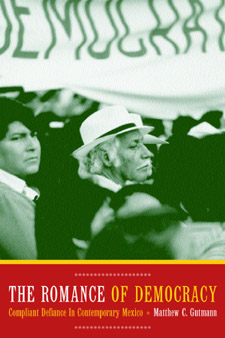 | Title: The romance of democracy: compliant defiance in contemporary Mexico Author: Gutmann, Matthew C 1953- Published: University of California Press, 2002 Subjects: Anthropology | Latino Studies | Latin American Studies | Sociology | Urban Studies Publisher's Description: The Romance of Democracy gives a unique insider perspective on contemporary Mexico by examining the meaning of democracy in the lives of working-class residents in Mexico City today. A highly absorbing and vividly detailed ethnographic study of popular politics and official subjugation, the book provides a detailed, bottom-up exploration of what men and women think about national and neighborhood democracy, what their dreams are for a better society, and how these dreams play out in their daily lives. Based on extensive fieldwork in the same neighborhood he discussed in his acclaimed book The Meanings of Macho, Matthew C. Gutmann now explores the possibilities for political and social change in the world's most populous city. In the process he provides a new perspective on many issues affecting Mexicans countrywide. [brief] Similar Items |
| 15. | 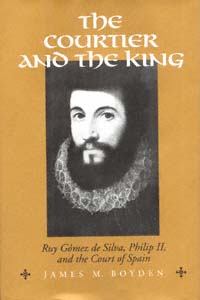 | Title: The courtier and the King: Ruy Gómez de Silva, Philip II, and the court of Spain Author: Boyden, James M 1954- Published: University of California Press, 1995 Subjects: History | European History | Autobiographies and Biographies Publisher's Description: Ruy Gómez de Silva, or the prince of Eboli, was one of the central figures at the court of Spain in the sixteenth century. Thanks to his oily affability, social grace, and an uncanny knack for anticipating and catering to the desires of his prince, he rose from obscurity to become the favorite and chief minister of Philip II.From the scattered surviving sources James Boyden weaves a vivid, compelling narrative: one that breathes life not only into Ruy Gómez, but into the court, the era, and the enigmatic character of Phillip II as well. Elegantly written and highly readable, this book discovers in the career of Gómez the techniques, aspirations, and mentality of an accomplished courtier in the age of Castiglione. [brief] Similar Items |
| 16. | 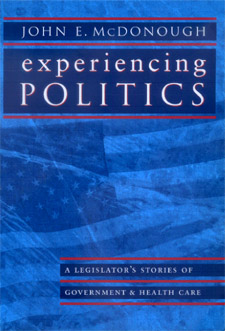 | Title: Experiencing politics: a legislator's stories of government and health care Author: McDonough, John E. (John Edward) Published: University of California Press, 2000 Subjects: Politics | Public Policy | Medicine Publisher's Description: John E. McDonough affords a rare glimpse into the practice of state politics in this insider's account of the fascinating interface between political science and real-life politics. A member of the Massachusetts House of Representatives for thirteen years and a skilled storyteller, McDonough eloquently weaves together stories of politics and policy with engaging theoretical models in a way that illuminates both the theory and the practice. By providing a link between scholarship and the world of experience, he communicates much about the essence of representative democracy. In the process, he demonstrates how politics extend beyond the public sphere into many aspects of life involving diverse values and interests. McDonough describes the nature of conflict, the role of interests, agenda setting, the nature and pace of change, the use of language, and more. Accessible, insightful, and original, his stories touch on a broad range of issues - including health care politics, campaigns, and elections; a street gang called the X-men; the death penalty; campaign finance reform, and tenants versus landlords. To the author, politics is everywhere and political dynamics are universal. While the setting for this book is one legislature, the lessons and insights are intended for everyone. [brief] Similar Items |
| 17. | 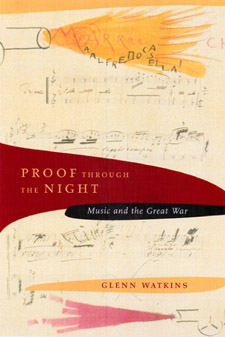 | Title: Proof through the night: music and the great war Author: Watkins, Glenn 1927- Published: University of California Press, 2002 Subjects: Music | Musicology | American Music | European History | United States History Publisher's Description: Carols floating across no-man's-land on Christmas Eve 1914; solemn choruses, marches, and popular songs responding to the call of propaganda ministries and war charities; opera, keyboard suites, ragtime, and concertos for the left hand - all provided testimony to the unique power of music to chronicle the Great War and to memorialize its battles and fallen heroes in the first post-Armistice decade. In this striking book, Glenn Watkins investigates these variable roles of music primarily from the angle of the Entente nations' perceived threat of German hegemony in matters of intellectual and artistic accomplishment - a principal concern not only for Europe but also for the United States, whose late entrance into the fray prompted a renewed interest in defining America as an emergent world power as well as a fledgling musical culture. He shows that each nation gave "proof through the night" - ringing evidence during the dark hours of the war - not only of its nationalist resolve in the singing of national airs but also of its power to recall home and hearth on distant battlefields and to reflect upon loss long after the guns had been silenced. Watkins's eloquent narrative argues that twentieth-century Modernism was not launched full force with the advent of the Great War but rather was challenged by a new set of alternatives to the prewar avant-garde. His central focus on music as a cultural marker during the First World War of necessity exposes its relationship to the other arts, national institutions, and international politics. From wartime scores by Debussy and Stravinsky to telling retrospective works by Berg, Ravel, and Britten; from "La Marseillaise" to "The Star-Spangled Banner," from "It's a Long Way to Tipperary" to "Over There," music reflected society's profoundest doubts and aspirations. By turns it challenged or supported the legitimacy of war, chronicled misgivings in miniature and grandiose formats alike, and inevitably expressed its sorrow at the final price exacted by the Great War. Proof through the Night concludes with a consideration of the post-Armistice period when, on the classical music front, memory and distance forged a musical response that was frequently more powerful than in wartime. [brief] Similar Items |
| 18. |  | Title: Endless night: cinema and psychoanalysis, parallel histories Author: Bergstrom, Janet 1946- Published: University of California Press, 1999 Subjects: Cinema and Performance Arts | Art Theory | Psychology Publisher's Description: The "endless night" that film theory and psychoanalysis share is the darkness that these two disciplines face in their quest for the logics of intelligibility. This collection emphasizes the history of theory to demonstrate that film theory must be written with a strong sense of historical consciousness, curiosity, and archaeological craft. The volume brings together film theorists and practicing psychoanalysts to encourage an exchange of views between disciplines that encounter each other all too rarely. [brief] Similar Items |
| 19. | 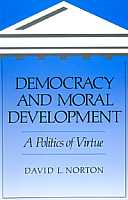 | Title: Democracy and moral development Author: Norton, David L Published: University of California Press, 1990 Subjects: Philosophy | Political Theory | Ethics Publisher's Description: At a time when politics and virtue seem less compatible than oil and water, Democracy and Moral Development shows how to bring the two together. Philosopher David Norton applies classical concepts of virtue to the premises of modern democracy. The centerpiece of the book is a model of organizational . . . [more] Similar Items |
| 20. | 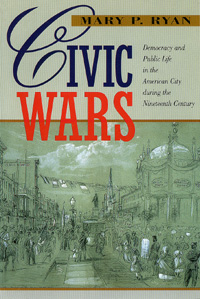 | Title: Civic wars: democracy and public life in the American city during the nineteenth century Author: Ryan, Mary P Published: University of California Press, 1997 Subjects: History | United States History | Urban Studies | Gender Studies | Ethnic Studies Publisher's Description: Mary P. Ryan traces the fate of public life and the emergence of ethnic, class, and gender conflict in the nineteenth-century city in this ambitious retelling of a key period of American political and social history. Basing her analysis on three quite different cities - New York, New Orleans, and San Francisco - Ryan illustrates how city spaces were used, understood, and fought over by a dazzling variety of social groups and political forces. She finds that the democratic exuberance America enjoyed in the 1820s and 1840s was irrevocably damaged by the Civil War. Civic life rebounded after the War but was, in Ryan's words, "less public, less democratic, and more visibly scarred by racial bigotry."Ryan's analysis is played out on three different levels - the spatial, the ceremonial, and the political. As she follows the decline of informal democracy from the age of Jackson to the heyday of industrial capitalism, she finds the roots of America's resilient democratic culture in the vigorous, often belligerent urban conflicts that found expression in the social movements, riots, celebrations, and other events that punctuated daily life in these urban centers. With its insightful comparisons, meticulous research, and graceful narrative, this study illustrates the ways in which American cities of the nineteenth century were as full of cultural differences and as fractured by social and economic changes as any metropolis today. [brief] Similar Items |